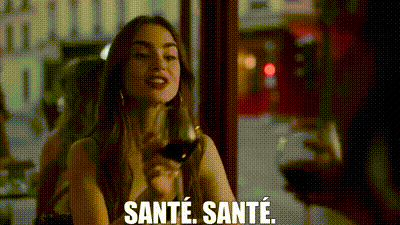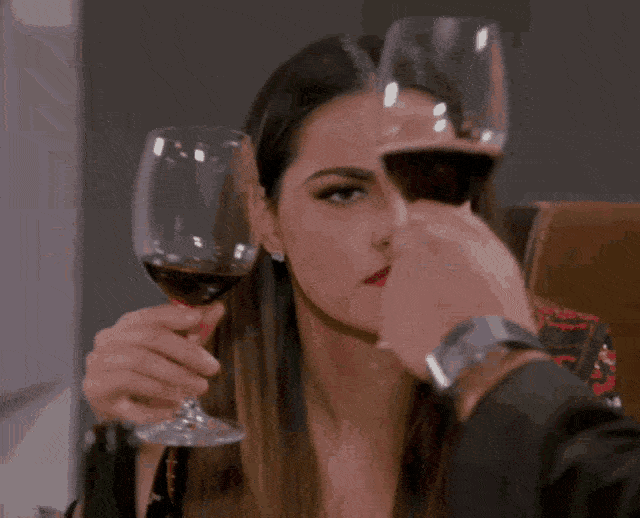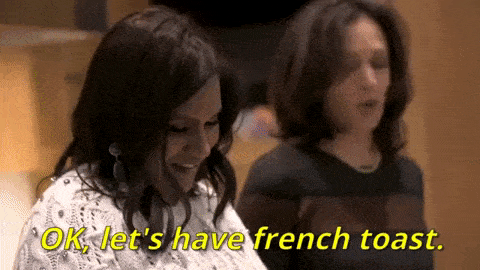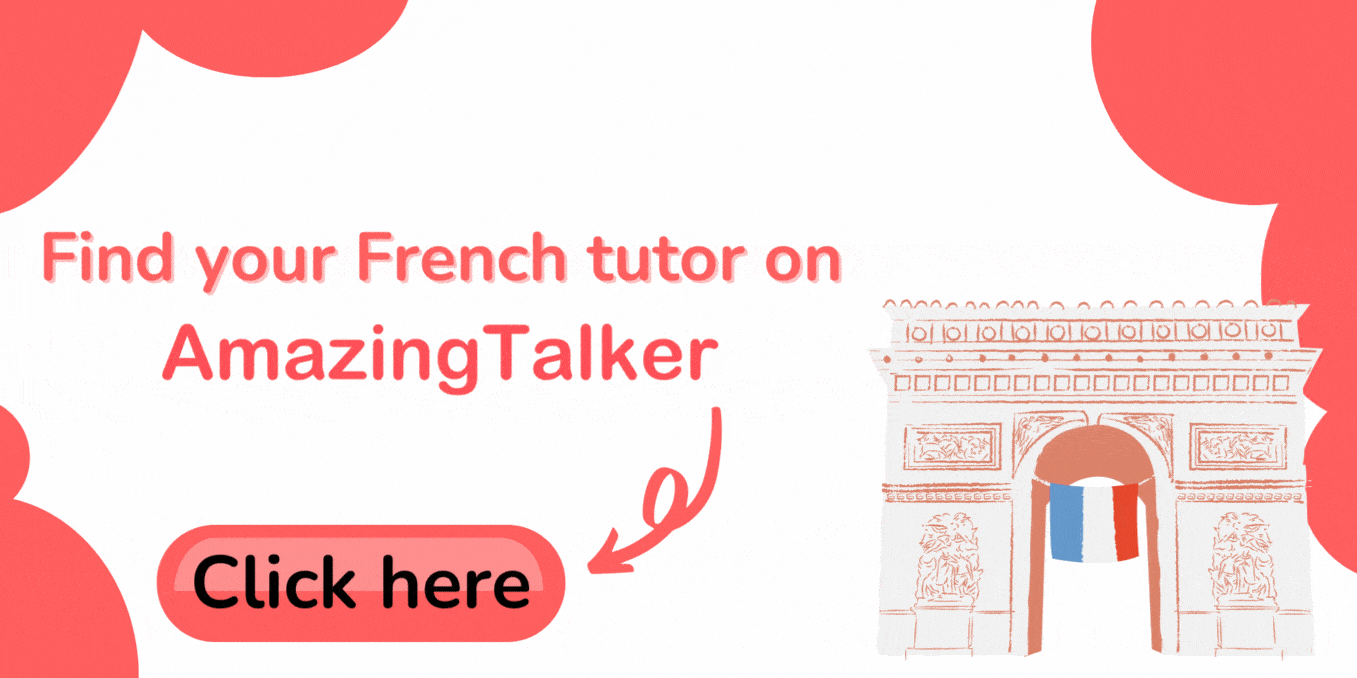Ever wondered how to say cheers in French? A common way to say cheers in French is by saying “À votre santé”, which literally means “to your health”. Giving a toast at a gathering is one of the important French traditions and culture as it is very useful in various locations and events, from formal functions to social gatherings, and can also help you to understand the Romance language used in French vocabulary.
Of course, there are more expressive ways to say cheers in French. Also, there are many traditions and rules that should be followed when saying cheers in French, so in this article, we will discuss different words and phrases that people use to say cheers in French, how you should reply, the etiquette when making a toast as well as the origin of this French culture.

How to Say Cheers in French?
Now let us dive deep into the different phrases you can use to make a toast, other information you must know, and more importantly how to pronounce the phrases.
1. À votre santé (to your health)
À votre santé is the most common phrase used to say cheers in French. It basically means “to your health” and it’s the generic toast that you can use in a singular or plural form (2 or more people) and in both informal and formal situations. You are welcome to use this phrase with your boss, a friend, or even a stranger in a restaurant, only that you may not sound as efficient as a natural French speaker. To sound like a native speaker, you may want to use a better expression such as À ta santé, which is more accepted by everyone.
2. Santé (Health)
Having problem pronouncing À votre santé, don’t worry the French also love to shorten their phrases. I am pleased to inform you there is a shortened version of that expression which you can easily use to mean the same thing as “À votre santé”. You can just say Santé, which literally translates to “Health”. Also if you don’t know whether to use a formal or informal way to say cheers, then Santé is a safe word to use.
3. À ta santé (to your health)
The expression “À ta santé” is similar to “à votre santé”. It’s the other generic toast used for the singular informal version of saying cheers in French. This phrase seems more welcomed and accepted by people and should often be used with friends and people you know well.
4. À la vôtre (to yours)
How can you respond to “à votre santé”? A suitable way to respond to this expression is by saying ”à la vôtre” which literally means “to yours”. You can use “à la vôtre” with people you don’t know well and generally in formal situations. Again, these phrases both have the same meaning and the difference lies in the level of politeness. You can use “à la vôtre” with people you don’t know well while “à la tienne” is better kept for friends, family members, and people you’re close to.
5. À la tienne (to yours)
Similar to the different ways in which you can say cheers in German, there are different expressions that may actually mean the same. An example is the phrase “À la tienne” which is very similar to “à votre santé”. If you are toasting a good friend one-on-one, you would say, “à la tienne” (to your) which refers to the health, singular informal.
6. Trinquons (Let’s drink)
Trinquons, which literally means “Shall we drink?” or “Let us drink is a French word that refers to the act of clinking your glasses together during or after a toast. The term trinquons is derived from the verb trinquer (a regular “-er” verb), and conjugated into the imperative nous form, trinquons, which means “(Let’s) make the glasses clink together!” Trinquons can alternately be translated as “to drink” and can be used to offer a toast. If you were to hear the phrase “on trinque?” while you’re out with friends, it means “shall we toast?” and uses the same verb (trinquer) in the present tense. Trinquons is a fairly casual method of giving a toast in French. You might use this in a conversation about an achievement or success.

7. Tchin Tchin (please please)
Another informal way to toast in French is by using the phrase Tchin Tchin. This phrase comes from the old Chinese adage “qǐng qǐng”, which means “please please”, as in, please drink! This adage and subsequently the phrase was created by soldiers who spent time in China during the Second Opium War and the term qǐng qǐng was used to invite people to have drinks, and it has since become widely used. This way of saying “cheers” in French is usually reserved for individuals you are familiar with and is rarely used in formal situations*. Tchin tchin* can also be seen as a fun replacement of the more traditional “à ta santé” and “à votre santé”.
8. Portons un toast (Let’s raise a toast)
Now, let us look at how to say cheers in French in an official gathering. There are two ways to propose a French toast in official settings. The first is by saying “portons un toast”. Lift your glass and suggest to your listeners, “Portons un toast”. If you want to tell people who or what you are toasting, add “à” and your subject. For example, “Portons un toast à la santé du nouveau-né!” (Let’s toast to the health of the new baby).
9. Levons nos verres (Let’s raise our glasses)
The second formal way to propose a toast in French is to say “Levons nos verres” (Let’s raise our glasses). In the same way as portons un toast, you can add “à” and your subject to make this more specific.
10. Cul sec (bottoms up)
Cul sec is a toast used when drinking alcohol. If you’re giving a toast in French with strong liquor, such as whiskey, and you hear someone say “cul sec” (dry bottom), that’s your cue to… well, dry the bottom of the glass. If possible, drink till your glass is empty. But use caution with this one. If someone makes a toast and orders a cul sec on a full pint of beer, think carefully before you do.

Dos and Don’ts when making cheers in French
Now that we have looked at the different ways to say cheers in French, let us discuss things you should and should never do when making cheers in French gatherings. There are a number of rules, etiquette, and rituals you must follow to properly make French toast. Let us look at them.
1. Never toast with non-alcoholic beverages
Making a toast with fruit juice or water is frowned upon in France. To commemorate the passage of a loved one into the afterlife, the Greeks would toast with water. When you’re proposing a toast to a new marriage or child, this is definitely the last thing you want to happen!
2. Look into the eyes
In France and most of Europe, eye contact is key. If you are saying cheers during a toast, look into the eyes of the person you are clinking your glass with. If you fail, you are doomed to seven years of bad luck or bad sex, depending on who you ask!
3. Stay cool, no ice
While making French toast, never put ice in your wine, especially red or white, however, rosé is an exception. If you must add ice, do it in private! Making a toast in French with ice in your glass is strictly forbidden. Even vin de glace (ice wine) is devoid of ice. When your ice melts, it dilutes your wine, which is regarded as a disrespectful act to the vigneron’s craft (wine-maker). That’s not very French!

4. Bottoms up
If you are toasting in French with hard liquor, such as whiskey, and you hear someone remark “cul sec” (dry bottom), that’s your cue to dry out the bottom of the glass. Drink until your glass is emptied, preferably all at once. But be cautious with this one. If someone makes a toast and requests a cul sec on a full pint of beer, please reconsider it!
5. Think before you drink!
If you propose a toast in French, make sure everyone has a full glass before you begin. And when we say full, we mean half-full to enable your wine to breathe.
6. Keep it up
Try to maintain your glass cup raised during the speech and until everyone has done clinking their glasses. Don’t put down your glass until everyone has taken their first taste!
Why Clinking Glasses When Making a Toast?
But why do French people clink their glasses when making toast? There is definitely a historical event that led to people doing that. The habit of clinking your glass when offering a toast in French evolved from an old French practice of swapping a portion of the liquid in glasses. By exchanging some liquid, you would be sure that you are not going to swallow a glass of poison, and that if you are, your adversary would also go down with you. You are less likely to get poisoned nowadays.
FAQs
There are many phrases to say cheers in French but the most commonly used phrase is À votre santé which means “to your health”. If you are struggling to pronounce the phrase, you can just say Santé, which is its short form. Other phrases you can use are À ta santé, etc.
To reply to Sante, you would say À la vôtre which literally means “to yours”. This phrase is often used in formal contexts e.g for your boss, teacher, or in business meetings. To reply to people you have a casual or informal relationship with you can say “à la tienne” instead. This is better for friends, family members, and people you’re close to.
Tchin Tchin is a word that originates from the old Chinese adage “qǐng qǐng”, which means “please please”. Tchin Tchin is used to urge people to drink. This term is usually reserved for individuals you are familiar with and is rarely used in formal situations.
Santé! That’s How You Cheers in French!
Learning how to say cheers in French will not only help you when you are at a French social gathering or event but will help you to better understand French culture and tradition. There are different ways to make a toast just like there are different ways to wish someone merry Christmas in French, so you must learn what phrase to use and when to use it. Just before you go, kindly check our blog on how to say you’re welcome in French, you will definitely need it to communicate with French people. To develop your French communication skills, check out AmazingTalker to connect with online French tutors who can assist you in learning the French language easily, efficiently, and quickly, and you would be speaking French like a native in a short time.

















